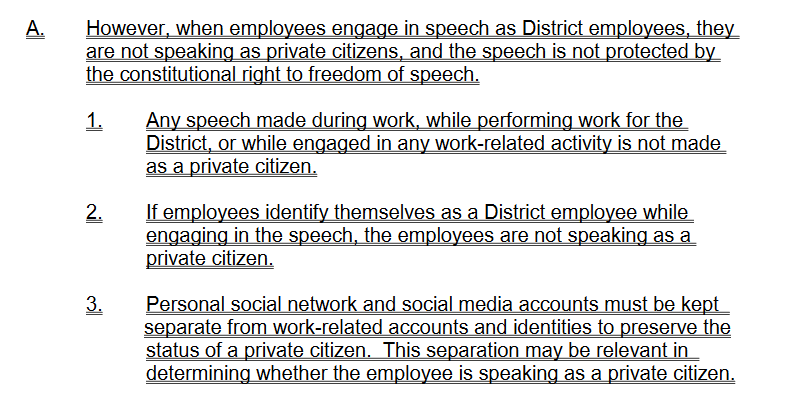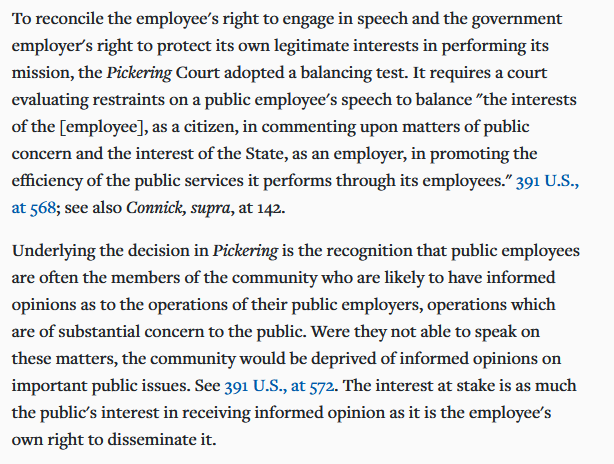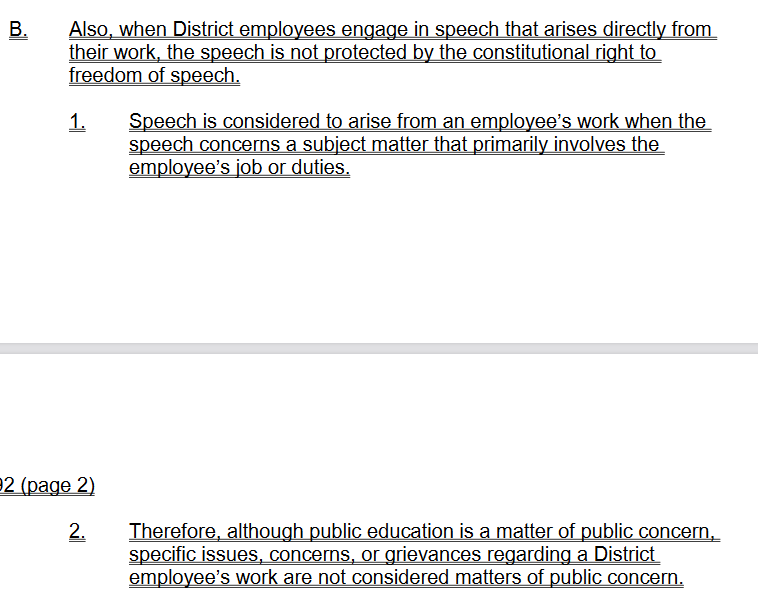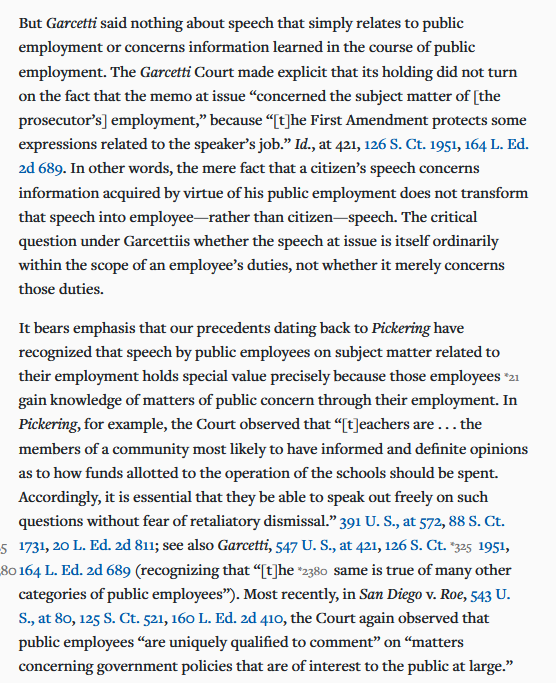
1/ Really Bad Policy Drafting: A Thread (Or "Why You Should Probably Have Someone Versed in the Subject Matter Write The Policy")
This proposed "Employee Freedom of Speech" policy from @ClarkCountySch has some really glaring First Amendment problems.
ccsd.net/district/polic…
This proposed "Employee Freedom of Speech" policy from @ClarkCountySch has some really glaring First Amendment problems.
ccsd.net/district/polic…
2/ It starts off innocently enough, correctly noting that the First Amendment protects a variety of expressive means and that public employees do not forfeit their First Amendment right to speak as private citizens on matters of public concern. 

3/ And whatever its problems (and lordy are there problems), Garcetti v. Ceballos is law and public employee speech made "pursuant to official duties" isn't constitutionally protected
Speech made as a private citizen on a matter of public concern, however, is generally protected
Speech made as a private citizen on a matter of public concern, however, is generally protected

4/ The policy starts to go off the rails when the district tries (very poorly) to define when an employee is not speaking as a private citizen on a matter of public concern. 

5/ First of all, it is absolutely not the case that any speech made "during work" is ipso facto not made as a private citizen.
Aside from the more complex issue of not all intra-workplace speech being related to official duties, a simpler example: employee tweets.
Aside from the more complex issue of not all intra-workplace speech being related to official duties, a simpler example: employee tweets.
6/ An employee's tweets don't magically become "pursuant to official duties" by virtue of when they were tweeted. Nor does talking to a co-worker about [issue of pressing sociopolitical importance] at work.
That blanket designation is incredibly and inappropriately overbroad.
That blanket designation is incredibly and inappropriately overbroad.
7/ Nor does public employee speech lose constitutional protection simply because the speaker identifies themselves as an employee of [government agency].
If the employee claims to be speaking *for* their employer, that would be another issue.
If the employee claims to be speaking *for* their employer, that would be another issue.
8/ But in developing protections for public employees, the Supreme Court has reasoned that these employees often have more informed views on some things by virtue of their employment and we *want* their input.
See San Diego v. Roe, 543 U.S. 77, 82 (2004): casetext.com/case/san-diego…
See San Diego v. Roe, 543 U.S. 77, 82 (2004): casetext.com/case/san-diego…

9/ Obviously if part of the rationale for protecting public employee speech is to encourage those with uniquely informed views to participate in important societal discussion, it would make no sense to strip their speech of protection if they say *why* their views are informed.
10/ The third part about it being a good idea to keep official and personal social media accounts separate and noting that conflation of the two can bear on the analysis of whether the speech is made as a private citizen is both unoffensive and reasonable, practical advice.
11/ Continuing along the path of getting something wrong about every public employee speech doctrine case, the policy serves up this whopper, claiming that speech that "primarily involves" an employee's job/duties isn't protected by the First Amendment. 

12/ But that's definitely *not* true. In line with the reasoning from San Diego v. Roe, the Supreme Court has expressly rejected the argument that speech that merely relates to an employee's job/duties. See Lane v. Franks, 573 U.S. 228 (2014): casetext.com/case/lane-v-fr… 

13/ So no, a teacher does not lose their First Amendment right to publicly opine about the quality or methods of instruction, or the subjects taught, school discipline, etc...
The case law is very clear about that.
The case law is very clear about that.
14/ Nor are "specific issues" relating to an employee's work automatically not matters of public concern. Plenty of specific issues relating to, say, a teacher's job are very much a MOPC
Some internal employment grievances may not be, but once again, the policy is far too broad
Some internal employment grievances may not be, but once again, the policy is far too broad

15/ Not content to only get the public employee speech doctrine wrong, whoever wrote this policy also decided to get big-picture First Amendment concepts ass-backwards!
16/ First we have this lovely paragraph. Surely some of those things are not constitutionally protected. But there is no "bullying/cyber-bullying" exception to the First Amendment, and if the speech is being made as a private citizen, discriminatory speech is certainly protected. 

17/ Then there's this. The first two just try to state the Pickering-Connick balancing test, but that last one is a real stinker.
What it does is conflate (bad) Supreme Court precedents that allow schools to regulate certain *STUDENT* speech in school/at school-sponsored events.
What it does is conflate (bad) Supreme Court precedents that allow schools to regulate certain *STUDENT* speech in school/at school-sponsored events.

18/ Bethel v. Fraser & Morse v. Frederick don't stand for the proposition that public employees lose the First Amendment right to engage in speech that is vulgar or "promotes illegal substances" as private citizens. It's like whoever wrote this just briefly scanned Wikipedia.
19/ Is there an argument that in certain circumstances that kind of speech may impact the school in a way that tips the balancing test? Sure.
But this policy blatantly tries to apply K-12 student speech standards to public employees at all times and in all places. Unsupportable.
But this policy blatantly tries to apply K-12 student speech standards to public employees at all times and in all places. Unsupportable.
20/ It's clear that whoever wrote this policy has only a superficial (at best) understanding of the relevant legal issues.
I strongly urge @ClarkCountySch to reject this policy. There are 1,001 ways this could end up in expensive First Amendment litigation. (cc: @ACLUNV)
I strongly urge @ClarkCountySch to reject this policy. There are 1,001 ways this could end up in expensive First Amendment litigation. (cc: @ACLUNV)
PS/ I know the public employee speech doctrine is an unglamorous and nerdy/niche thing to concern one's self with.
But it is super important! You should never have to sacrifice your right to participate in society by virtue of working for the government. We'd all be worse off.
But it is super important! You should never have to sacrifice your right to participate in society by virtue of working for the government. We'd all be worse off.
PS2/ I'm seeing a lot of Nevada educators and community members who are rightfully concerned by this proposed policy.
Make your voice heard! CCSD has a form to submit comment on this proposal: ccsd.net/district/polic…
Make your voice heard! CCSD has a form to submit comment on this proposal: ccsd.net/district/polic…
• • •
Missing some Tweet in this thread? You can try to
force a refresh






